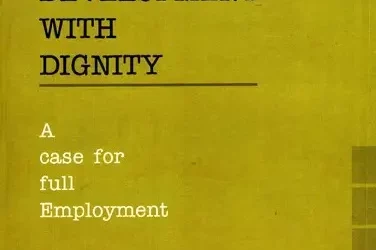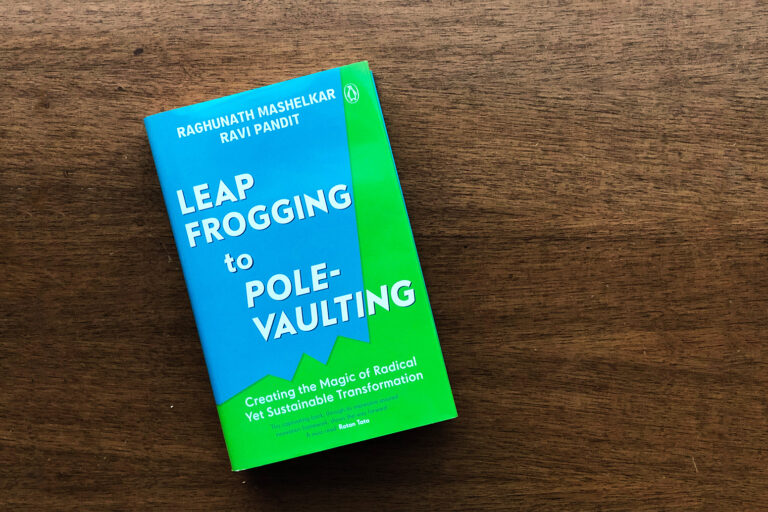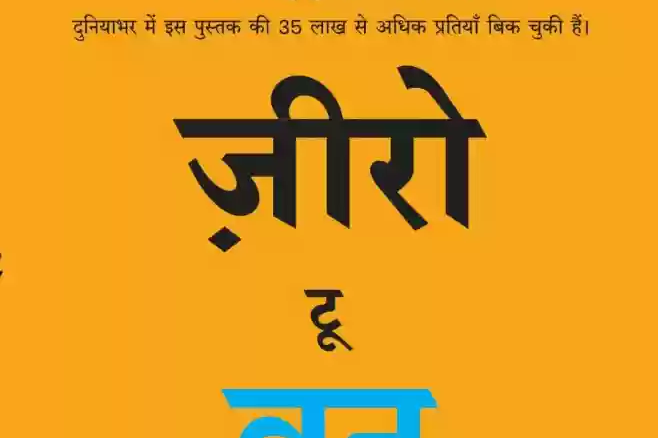By: Sambhawna Chaudhary, Assistant Professor, Dyal Singh College, University of Delhi, and Dr. Rashmi Rani Anand, Assistant Professor, School of International Studies, JNU
About the Author and the Perspective
Sandeep Singh is a renowned scholar in the field of management, who is committed to understanding the complexities of Indian management techniques. Motivated by the 2006 remarks made by Dr. Manmohan Singh, Sandeep set out to investigate the ‘Indian Way of Management,’ giving thought-provoking talks and writing ten perceptive books in Hindi and English across a range of disciplines. His desire to preserve the history of Indian commerce led to the creation of a private museum. His highly regarded Temple Economics series is based on in-depth study of Bharat’s commercial history. He believed this book would revive the nation, the society and Dharma.
Arthavyavstha of Mandirs (Temple Economics) by Sandeep Singh is an eye opener for the Hindus to understand their temples and their importance in Bharat and how they have been brain washed against their own temples. It tries to explain the temple’s economics and its flow.
The book is divided into four parts/ sections.The book’s strength is its depiction of numerous Mandirs located around India, along with their history of creation, destruction, and impact on people’s lives. The writer implores us to stop discussing, writing, and reading about the issues with the temple. The time to act is now.
Through the book, numerous compelling case studies demonstrated the significant economic impact of pilgrimages and how they benefit both the country and Dharma. Devi and Devtas’ names are written in their original (Hindu) form, which makes the author’s writing style distinctive. As an illustration, Dharma is written as Dharm, Rama as Ram, and so forth.
Using the words “Mandir” instead of “Temple” and “Arthvyavstha” instead of “Economics” has important implications! The fields of Arthvyavstha and Economics are very different from one another. The relationship between Mandir and Arthavyavstha has been expertly illustrated by the author.
The author in part one of the book tries to explain how the Mandir culture in Bharat is so unique it is a balanced mixture of social, cultural, economic, educational and unifying aspects. The Author explains that mandir-based Arthvyavstha is about well being of all the people who are associated with the Mandir like devotees, vendors, deities etc. Palani Mandir has the second highest revenue in India but that is used for a lot of welfare like polytechnic for women was established, an oriental college was established in 1960, and the revenue is used to protect classical art like Naadasvaram etc.
The author explains how Mandir based Arthvyavstha needs human resources, such as price, staff, cleaners, singers, and musicians. It also needs someone to supervise the work, someone to take care of all the duties. The physical structure and the ditties are also physical resources. Financial resources are required like funds or consumables like oil food, flowers, etc. It also needs information resources, such as spiritual references for rituals, mantras, knowledge of the Dharma etc. Mandir are not a place of worship only, they are a place full of cultural, social and economic life of the people. The daily routine especially of a large Mandir gives constant employment to the musician, dancers, florist, cooks and many others.
Starting from its Karamakaand (ritual), hold the heart of the Mandi talking about from flowers. Flowers hold a special place in a Mandir‘s and they are connected to our lives from the birth to the death talking about Jasmine flower. Jasmine flower is associated with Devi Meenakshi and the city of Madurai, the huge demand for jasmine in the Mandirs have made it a commercial crop, giving livelihood to more than hundreds of people, not just that according to the Charaka Samhita jasmine fragrance is used to calm the mind and the body, and eliminate a lot of mental issues like insomnia, etc.Traditional palm leaves are used to transport these jasmine to the temple. Flowers are also wrapped in banana leaves, which are eco-friendly, aesthetically, pleasing, and give livelihood to those who grow palm and banana. All the rituals are connected to the Arthvyavstha. Prashad the food or the Prasad, offered to God is later distributed to all the devotees, irrespective of their caste, religion, gender, and creed. cook, etc. Mandir has saved many of the Bhartiya vegetables as Mandir does not use non-Bharti vegetables like carrots, tomato, melons, etc. Lentis survived due to the Mandirs. Pulses are very important food crop globally and account. A large portion of the export pulses form an integral part of Bharti diet. The British used to feed these pulses to their birds and cattle and saw it as an inferior food but Mandir preserved these pulses, for example, chickpea survive because of Prashad that is Laddu Boondi Laddu is made from Channa, are cereal or food habit or values are only surviving because of Mandir and Bharti rituals.
The author explains that Shilpa refers to art and craft. So Mandir economy covers every aspect of art and culture like painting, architecture, dance, musician etc. A temple preserves these arts and crafts for example, Durgi stone craft is dated back to 3rd century CE idols of Devi and Devta are crafted from soft limestone, in Assam bamboo crafts are used to carve the statues of dieties, Mithila painting is devoted to the paintings of Gordon goddesses. Meenakshi Amman Mandir Is an example of beautiful architecture. It has a thousand pillar halls. In India, there are many people whose primary income is from selling these handicrafts, and people who visit these temples get attracted to this craft which directly creates better livelihood. The opportunity for individuals involved in handicraft exports amounted to USD 2.1 billion for the year 2021-22. A significant portion of this was attributed to Mandir crafts, which showcase Hindu Dharma-inspired designs. These crafts play a crucial role in contributing to the Mandir-based Arthavyavastha (economic system). Natya Mandir in Bharat have given immense space for dance, arts, music, poetry and performances Mandir have different places allocated for conducting cultural performances talking about art industry in India. It reached 47 billion in 2012 and was expected to witness a growth of more than 17.8% in 2018; a sizeable Arthvyavstha is just based on drama, music, art performances, etc. In Hindu temples, there are various types of Parikrama (circumambulation), each contributing to the local economy. These Parikrama routes often feature food outlets, seating areas, small temples, and vendors selling crafts and goods. Though considered part of the informal economy due to the lack of official accounting, these Parikrama significantly uplift the economy of the areas where they are performed. They also contribute to the Arthavyavastha because these Parikrama routes include food outlets, seating areas, small temples, and vendors selling crafts and goods. This informal economy, though not officially accounted, significantly uplifts the local economy of the areas where Parikrama is performed.
Mandir grow towns and cities. Mandir are the centre of the city and the city develop around it.A Mandir does not need to be at the center of a city, but its presence is crucial for the town’s development and sustainability. Every activity within the Mandir contributes to the growth of knowledge and the Arthavyavastha. The economy thrives on the Pooja and other activities in and around the Mandir. From construction to prayers, decoration, rituals, and Prasada, each step requires knowledge and resources. These activities boost the economy by providing economic benefits to the people involved.
In Part-2 of the book the author explains how Mandirs have been destroyed by various invasions, and how these invasions, since ancient time are directly on Bhartiya Arthvyavstha . This is how Bharat lost its Mandir-based Arthavyavastha.
In Part 3 the author investigates in to Loss of Mandir Ecosystem in post-Independence India and talks about how Bharat has lost major part of Mandir based Arthvyavstha and still losing it on a fast speed. Mandir are being lost discontinuation of a lot of rituals and traditions due to new instruments like RTI and PIL (public interest litigation and right to information), media and non-government organization whereas the politician, judiciary, bureaucracy, government, central or local are being the main people to execute it?
Bharat have lost a number of rituals, lot of priest are running away from the temple as Sanskrit as a language is being killed by different government and it is clearly predicted that it is the priests will be the next target. Some Hindu believes that a Puja can be performed without a Pujari whereas they forgot that these Pujari were one of the reasons that Hinduism have survived. They were the reason when invaders were destroying the Mandis,they used to hide the idols and used to run away risking their life.
In part four of the book the author emphasizes on the need to re-establish Mandir ecosystem
The author explained that the proof of success of Mandir based Arthvyavstha lies in the fact that in 21st century leaders specifically political parties and the central government have shown immense interest in expanding Hindu Mandir and taking over more Mandir.
Jawaharlal Nehru coined the face Temple of modern India while the construction of Bhakra Nagar Dam in 1954. He said that public sector units at Temple of modern economy whereas if you see the development during Nehru‘s phase were doing business with Mandir of Bharat, to remain profitable, public service sector units do give profit and develop Bharat, but it is true that Mandir has significant importance in our Arthvyavstha and it cannot go unnoticed. Mandir Arthvyavstha was important in the past will be important in the present and will be remain important in the future. Government sectors are taking these public sector units more importantly, and making money because of Mandir they have started the Postal Service of Ganga Jal delivery scheme, thousands of people, get Gangaajal delivered to their home and this initiative was taken up by Narendra Modi government to deliver the holy water to the doorstep of every Indian across the country. This not only strengthen Hinduism and tradition in Bharat but also generated a good amount of revenue in return, it also provided employment to 30 people for four months in a year, and through this post offices are also getting more attention. The next scheme which was holy blessing scheme through postal service started under the scheme, devotees can get Prashad delivered to their home through Indian postal service from different Mandir like Chintpurni Devi, Kashi Vishwanath ,Hanuman Gadi, Vaishno Devi, Amarnath, etc. Postal service gold sale also started in which world gold Council started market making money on Akshaya Tritiya in collaboration with postal department which again connected people to their festivals. Dharmik Yatra through railways is also an initiative. Government run Buddha circuit train package of 1,08,000 in first class and 90,214 AC to tire for seven night and eight day package, government has continued their Ramayana circuit and added Buddha circuit points to the fact as government is making money from this initiative and connecting the Dharmik places and various Mandir together. State government have used Prashad to help the self help group the Laddu which are available in the temple premises in Badrinath and Kedarnath are made out of locally grown grains and are packed in eco-friendly baskets, which are grown by the local people like bamboos. This not only boost employment, but also make use of the local environment and is completely eco-friendly in packaging. There are numerous example by which central and state government are connecting people to Hinduism and Mandir, whereas private sector also get benefit from Mandir like hospitality industry, religious tourism has given immense boost to domestic and international hospitality chains as Yatri go and stay in those places. Travel industry have also seen a boost the choppers in Amarnath are always fully booked. The success of airline means more airport and allied services. Thousands of private buses have been added that have given employment to a lot of drivers. Online service is also seen as progress in Mandir Arthvyavstha that offers facility of online Pooja online Darshan, there are online platform that sell Prashad from different Mandir. It is clear that not just the government or the private sector every individual from agriculturist to a businessman has benefited from Arthvyavstha of Mandir.
In conclusion the author remarks that the subject of Mandir Arthvyavstha’s 21st-century contribution from Bharat to the global community is now debatable! This book took the author four years to finish, but the effort was well worth it! With just one reading of this book, the reader will be able to learn everything there is to know about Mandirs thanks to the author’s meticulous writing.
The major old cities of India like Ujjain, Pushkar,Varanasi do not have a single industry, but this survived and the survival was because of the Mandir and it is enough to prove how much Bharat and India depend on Mandir based Arthvyavstha .Mandir is spread all over India Both in terms of Arthvyavstha and construction and destruction, the author tries to open the eyes of every Hindu on how their Dharam is being destroyed by the invasion and is continuously being destroyed by the politician bureaucrats, media, etc.
This book will give present and future generations a fresh perspective on the Mandir. It offers insightful information about the Temple-based economy. The book has numerous tables that give readers a thorough understanding of the many facets of Mandirs. A few additional images in the book would have improved the information retention and made it easier on the eyes.






